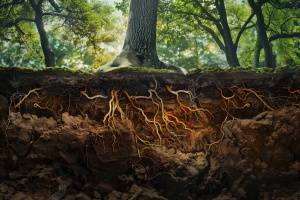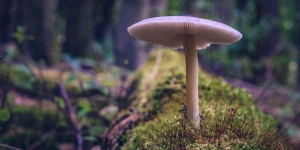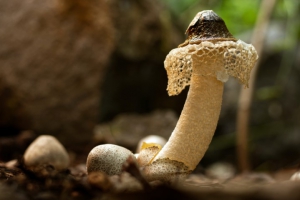If you remove the mushroom, nature falls apart
We often think of mushrooms as the visible fruit of a hidden world. A delicacy, a medicine, or simply a curiosity popping up after the rain. But beneath every mushroom lies an unseen network that is nothing less than the foundation of life on Earth. Remove the mushroom and nature, as we know it, begins to fall apart.
The hidden network beneath our feet
Every forest, meadow, and even your backyard soil hides a dense web of fungal threads called mycelium. This living network connects plants, trees, and microorganisms in an intricate underground communication system. It transports water, nutrients, and information, a kind of “wood wide web” that sustains entire ecosystems.
Without fungi, plants would struggle to grow. In fact, more than 90% of all plant species depend on a partnership with fungi known as mycorrhiza. These fungi attach to plant roots, exchanging minerals and moisture for sugars and carbon. It’s a perfect example of nature’s collaboration and without it, most forests would collapse.
The great recyclers
Fungi are the world’s ultimate recyclers. They decompose dead trees, fallen leaves, and animal remains, breaking down complex materials into nutrients that can be reused by other organisms. Without this process, forests would be buried under layers of organic waste, and the soil would become sterile.
In essence, fungi close the circle of life. When we remove them through soil degradation, chemical overuse, or deforestation, we break that natural recycling system. Nutrients stop flowing, and biodiversity declines.
An unsung climate ally
Fungi don’t just support plants — they also store massive amounts of carbon underground. Mycorrhizal fungi capture carbon from plant roots and lock it into the soil for decades or even centuries. Destroying fungal networks not only weakens plant life but also releases stored carbon back into the atmosphere, accelerating climate change.
The mushroom’s message
Mushrooms are the tip of a vast, intelligent system that has quietly sustained life for over a billion years. They are nature’s architects, caretakers and messengers, indicators of ecosystem health. When mushrooms disappear, it’s not just a culinary loss; it’s a warning sign that our environment is out of balance.
Protecting fungi means protecting life itself. Healthy soil, resilient forests, clean air, and even the food we eat all depend on the unseen world beneath our feet. So next time you see a mushroom in the wild, take a closer look. It’s not just a fungus, it’s a lifeline.
How do you see the role of fungi in the future of a healthier planet? We’d love to hear your thoughts, so drop us a line below!
‘fungi stool’ BY satoshi itasaka
In an effort to learn more about natural decomposers such as fungi and bacteria, Japanese designer Satoshi Itasaka unveils the ‘Fungi Stool’. As its title suggests, the stainless steel and wood stool is composed of fungi that grow and bloom, like flowers, into mushrooms.
‘It is no exaggeration to say that the cycles of nature are carried out by bacteria and fungi,’ Itasaka notes. ‘Bacteria and fungi have been the decomposers in the food chain keeping the earth’s environment in a healthy state. They are the ones we should follow for we are constantly putting a burden on the earth in terms of the global environment.’
Preserving fungi decomposers
Satoshi Itasaka’s Fungi Stool highlights the importance of preserving fungi decomposers as they play a crucial role in our ecosystem. It also proposes a more sustainable direction to furniture design. Its seat is made up of a circle of six discs that somewhat resemble mushroom caps huddled next to each other.
‘There are about 100 trillion bacteria in our bodies’, the product designer explains. ‘Therefore, we live in symbiosis with about three times as many bacteria as our own cells. Although we are sometimes tormented by bacteria, the environment in which we live would not be possible without decomposers such as fungi and bacteria. The world is in the midst of a sanitization boom, but I designed a device to learn more about these decomposers, not to get rid of them. I found that the fungi grew unexpectedly in that apparatus. The fungi grew and blossomed like flowers, producing numerous beautiful mushrooms.’
Source: Designboom
A team of Western mycologists (fungi experts) spent the past two summers digging deep in Newfoundland dirt to investigate the might of mushrooms and found what lies beneath truly is 'the main character' in most terrestrial ecosystems.
Fungi, which produce mushrooms, are critically important in most earthbound ecosystems as they provide life-sustaining mineral nutrients to plants while decomposing their remains, and recycling both organic and inorganic byproducts throughout the biome as they grow and reproduce.
"A lot of ecologists are beginning to realize that mushrooms really run the world. We've quite naturally spent a lot of our time focusing on things above ground, things that we see like plants, animals, and birds," said Western biology professor Greg Thorn. "But in fact, the plants are very closely associated with fungi, and basically wouldn't be there (above ground) without them."
Please read the full article here.
Source: Phys.org provided by University of Western Ontario
Fungi that decompose plant matter may keep ecosystems healthy, especially after drought
The red, orange, and spotted mushrooms that sprout up after it rains are doing more than adding color to the landscape. The fungi that produce them could be keeping the natural world productive and stable, according to a new study. Indeed, they may be critical to the health of Earth’s ecosystems, says Matthias Rillig, a soil ecologist at the Free University Berlin who was not involved with the work.
Please read the full article here.
Author of article: Elizabeth Pennisi
Source: Science
























